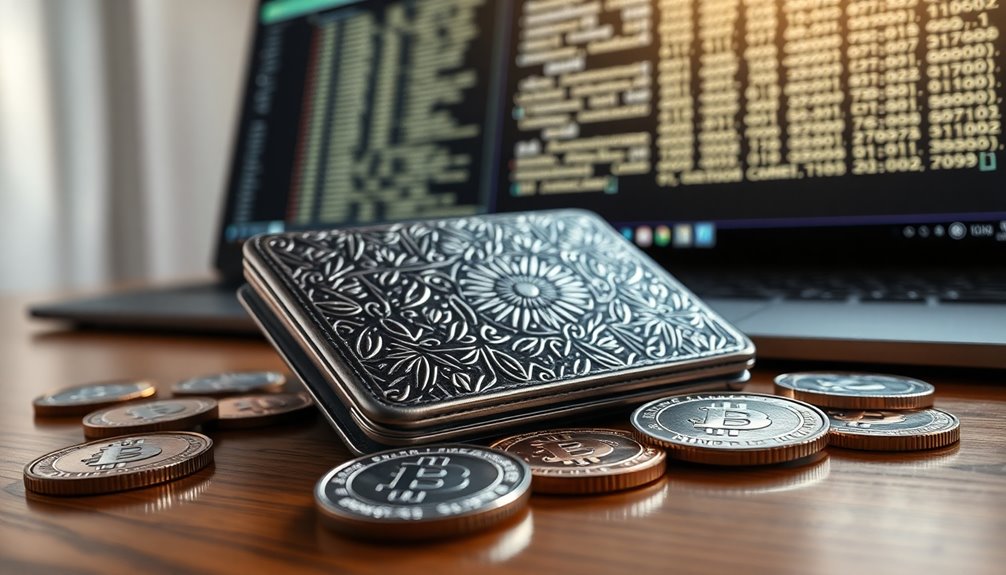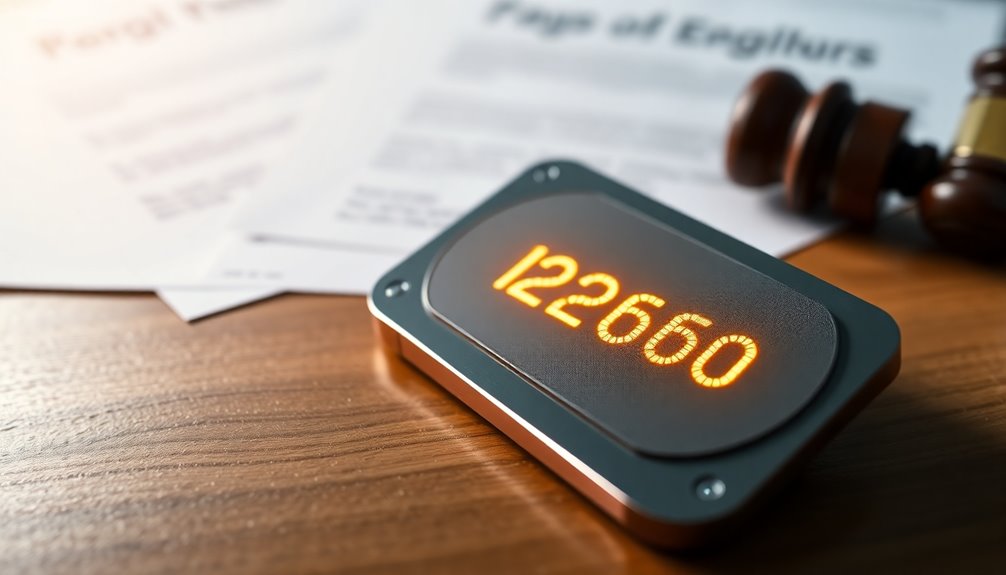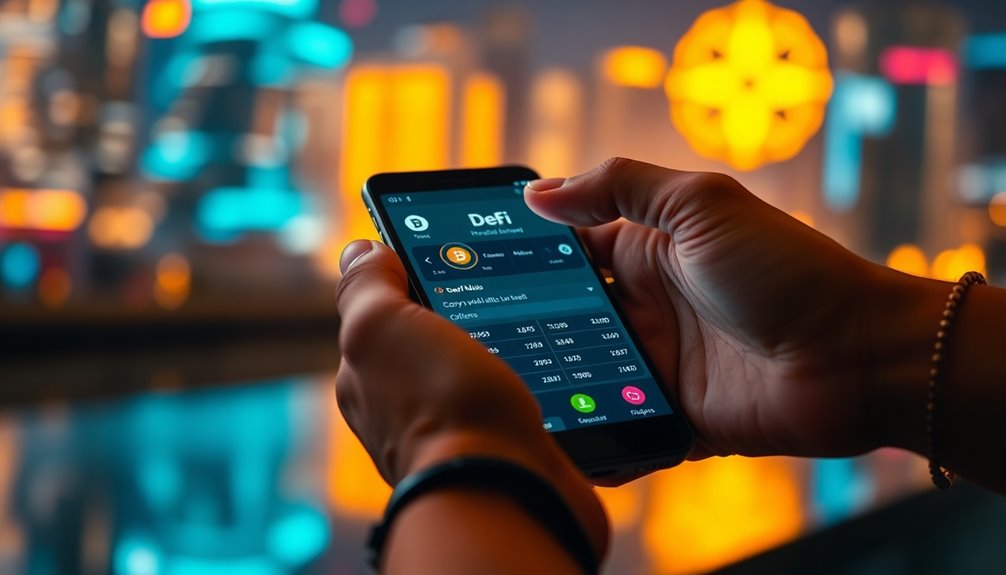When you're navigating the world of cryptocurrency, understanding wallet addresses is crucial. These unique identifiers, typically formatted with a specific character count and prefix, are what you'll use to send and receive assets safely. You might think copying an address is straightforward, but one small mistake can lead to lost funds. As you explore the nuances of wallet addresses, you'll discover the importance of accuracy and security in your transactions. So, what happens if you send crypto to the wrong address? Let's unpack that.
Key Takeaways
- A wallet address is a unique identifier for blockchain accounts, essential for sending and receiving cryptocurrencies.
- Formats vary by blockchain; for instance, Ethereum addresses start with '0x' and are 42 characters long.
- Wallet addresses are generated from public keys and include checksums for security, ensuring accurate transactions.
- Access wallet addresses in the "Receive" or "Deposit" sections of your cryptocurrency wallet, often displayed as QR codes.
- Always double-check addresses before transactions to avoid sending funds to incorrect or malicious addresses.
Understanding Wallet Address Basics

A wallet address is your digital identity in the world of cryptocurrencies. It's a unique string of characters that identifies your account on the blockchain, allowing you to send and receive digital currencies.
The format differs by blockchain; for instance, Ethereum addresses are 42-character hexadecimal strings starting with '0x', while Bitcoin addresses range from 26 to 35 characters and start with '1', '3', or 'bc1'. Different blockchains have various address formats, which can impact how you manage your digital assets.
Wallet addresses are created using a combination of a prefix, public key, and checksum for added security. They're crucial for verifying transactions, as the public key ensures accuracy when sending funds.
You can find your wallet address in the "Receive" or "Deposit" section of your wallet, often displayed as a QR code for easy access.
Regulatory Changes Impacting Crypto

As regulatory landscapes evolve globally, the crypto industry faces significant changes that impact how digital currencies are managed and utilized.
In Brazil, the Cryptoassets Act aims to prevent scams, while the UK mandates authorization for companies dealing in digital currencies. The EU's MiCA regulation sets new industry standards, and U.S. states like Wyoming and Texas are pushing progressive legislation. A global approach to crypto regulation is necessary to manage risks and leverage technology benefits effectively.
Consumer protections are becoming a priority, with an increased focus on fraud, cybersecurity, and financial crimes. Additionally, new Treasury regulations starting in 2025 will require centralized exchanges to report transactions, reflecting a shift toward compliance.
Staying informed about these changes is crucial for navigating the crypto space effectively and safeguarding your investments.
Market Volatility and Price Fluctuations

Navigating the crypto landscape isn't just about understanding regulations; it also requires grappling with market volatility and price fluctuations. Market demand and supply dynamics play a crucial role here. When demand increases, prices typically rise, while oversupply can lead to declines. Cryptocurrencies with limited supply, like Bitcoin, often see higher prices due to this balance. Additionally, government regulations can create sudden shifts in market dynamics, further contributing to price instability.
Security breaches can spark panic, causing rapid price drops as investor confidence wavers. Moreover, market sentiment greatly influences prices; positive news can boost values, while negative developments lead to declines. The speed at which information spreads through social media further exacerbates these fluctuations, making it essential for you to stay informed and responsive to the ever-changing market landscape.
Corporate Blockchain Integration

How can corporate entities leverage blockchain technology to enhance their operations? By integrating blockchain, you can significantly boost data security through immutable records and real-time monitoring. This ensures that all transactions are traceable and secure from unauthorized access. Additionally, many companies, such as Walmart and Maersk, are already demonstrating how blockchain adoption can improve transparency and efficiency in their operations.
Transparency is another key benefit; an immutable ledger allows all parties in a transaction to have access to the same accurate information, reducing disputes and improving reporting. You'll also notice reduced operating costs as smart contracts automate manual tasks and eliminate intermediaries. This automation speeds up processes, enhancing overall efficiency. Furthermore, the instantaneous execution of tasks improves agility, leading to faster delivery times and a better customer experience. Embracing blockchain can truly transform how your corporation operates.
Election Outcomes and Market Reactions

With the recent election outcomes shaking up the financial landscape, market reactions have been swift and pronounced.
Bitcoin soared to a record high of $75,000, entering a phase of price discovery, while altcoins like Ethereum and Dogecoin also enjoyed substantial gains. This volatility reflects a positive sentiment among investors, driven by expectations of a more crypto-friendly environment under Trump's leadership. His pro-crypto stance and promises to reduce regulations have instilled confidence, leading the crypto industry to welcome these changes. As retail investor activity surged, the US dollar strengthened, equity futures and crypto-related stocks surged, signaling a broader market rally.
The Blockchain Association and industry CEOs expressed optimism, anticipating significant legislative progress in the coming months.
Emerging Trends in DeFi

As the decentralized finance (DeFi) landscape evolves, new trends are reshaping how you engage with financial services.
You'll notice decentralized lending platforms like Aave and Compound gaining traction, offering flexible lending options enhanced by tokenization and cross-chain capabilities.
Meanwhile, real-world asset (RWA) tokenization is increasing liquidity and attracting new investors, all while ensuring regulatory compliance. The global DeFi market is projected to reach USD 616.1 billion by 2033, highlighting its growth potential.
Enhanced security protocols, including multi-signature wallets and zero-knowledge proofs, are becoming standard, boosting your confidence in DeFi transactions.
Additionally, human-readable wallet addresses improve user experience, reducing errors and making cryptocurrency management easier.
These trends collectively enhance efficiency, security, and accessibility, transforming your approach to finance in the DeFi space.
Frequently Asked Questions
How Do I Create a Cryptocurrency Wallet Address?
To create a cryptocurrency wallet address, start by choosing a wallet that suits your needs.
Once you've set it up, it'll automatically generate a private key and derive your public key. The wallet then transforms your public key into a wallet address.
Make sure to keep your private key secure. For added privacy, generate a new address for each transaction instead of reusing the same one. This helps protect your financial history.
Can I Use the Same Address for Multiple Transactions?
You can use the same address for multiple transactions, but it's not recommended.
Reusing addresses can compromise your privacy and security, making it easier for others to track your transactions and link them back to you. Each time you use the same address, you expose your public key, increasing the risk of potential attacks.
For better privacy and safety, consider generating a new address for each transaction instead.
What Happens if I Lose My Wallet Address?
Imagine losing the key to your house—you can't access your belongings.
If you lose your wallet address, it's similar; without your private keys or recovery phrases, your cryptocurrency becomes impossible to access.
You might forget passwords, suffer hardware failures, or accidentally send funds to the wrong address, rendering them irretrievable.
To avoid this, always back up your wallet and keep your recovery information safe and secure.
Are Wallet Addresses Case-Sensitive?
Yes, wallet addresses can be case-sensitive, depending on the blockchain.
For instance, Bitcoin addresses are case-sensitive, meaning that even a small change in letter case can lead to sending funds to the wrong address.
On the other hand, Ethereum addresses aren't case-sensitive, treating uppercase and lowercase letters as the same.
It's crucial to double-check your entries to avoid errors and ensure your transactions go through smoothly.
Always be cautious when entering addresses!
How Do I Verify a Wallet Address Before Sending Funds?
To verify a wallet address before sending funds, you can use several methods.
First, sign a message using your wallet to confirm ownership.
Alternatively, take a screenshot of your wallet displaying the address and upload it for verification.
You can also use a blockchain explorer to check the address's activity.
Lastly, authenticate through your wallet's settings by entering a one-time password (OTP) to ensure you're sending funds to the correct address.
Conclusion
In the vast ocean of cryptocurrency, your wallet address is like a lighthouse guiding your digital assets safely to shore. By grasping the basics of these unique identifiers, you're not just navigating the waves; you're charting your course through a world of innovation and opportunity. As regulations shift and trends emerge, keep your compass steady. Embrace the journey with confidence, and let your wallet address illuminate the path to your financial future.









